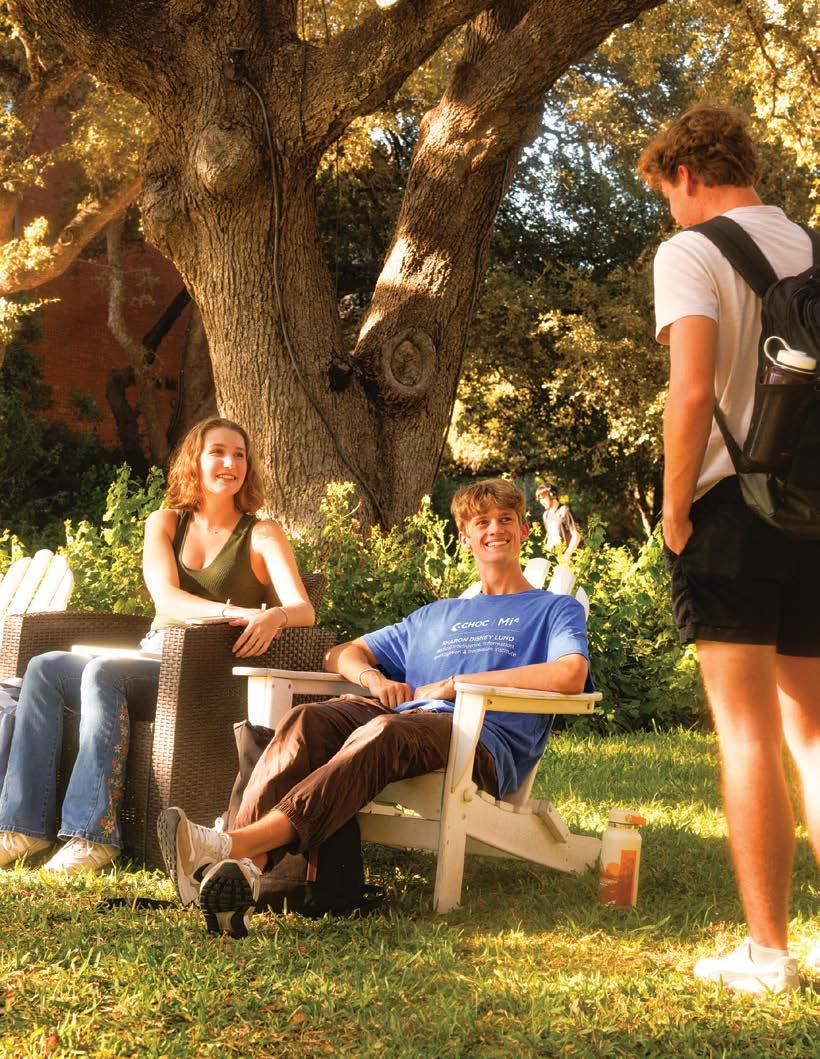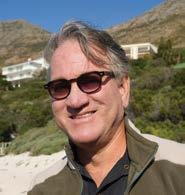










We are pleased to present the 2024-2025 Trinity Endowment Report, a reflection of how your generosity shapes the University today and secures its future. The endowment is more than an investment; it is a promise to future generations, a steadfast source of strength that enables Trinity to navigate uncertainty, seize opportunities, and remain true to its educational mission of empowering students to lives of service, leadership, and accomplishment.
Your investment enabled Trinity to reach several important milestones in fiscal year 2025:
• Trinity rose to No. 37 in the 2026 U.S. News & World Report’s rankings of National Liberal Arts Colleges, continuing a rapid ascent since entering this category at No. 55 just three years ago. Trinity also earned top rankings in innovation, value, teaching, research, and engineering, underscoring the excellence and momentum across our campus.
• The endowment hit an all-time high, eclipsing the $2 billion threshold officially as of July 2025. This critical achievement reflects a powerful combination of strong investment performance and new, generous gifts to the endowment. Building on that momentum, President Vanessa B. Beasley, Ph.D., announced in September a transformative $25 million gift from the Malú and Carlos Alvarez family to name the Carlos Alvarez School of Arts and Humanities. This investment strengthens scholarships, faculty excellence, and student opportunities, reaffirming that the arts and humanities remain a vibrant cornerstone of a Trinity education.
• In Spring 2025, Trinity publicly launched Our Time: The Campaign for Trinity University. This historic $300 million effort will shape the University for generations to come by expanding financial access to a Trinity education and advancing excellence. Guided by Ready. Set. Rise., our new strategic plan, Our Time unites alumni and friends in supporting student success and institutional distinction. Together, these efforts strengthen Trinity’s student-centered mission, attract exceptional talent, enhance academic and residential life, and position the University as a nationally respected institution serving students in San Antonio and the region.
A significant and welcome development this year regards the endowment excise tax. With the passage of the One Big Beautiful Bill Act this July, Trinity will now be exempt from this tax. In our advocacy with Congress, we committed to investing those savings in even greater support of student financial aid and scholarships. We are developing some creative and exciting ideas to use those savings to support our students.



These achievements affirm Trinity’s enduring commitment to a transformative student experience grounded in academic excellence and innovation.
We are honored to steward your generosity and look forward with excitement to all that lies ahead.
With gratitude,

Craig Crow Chief Investment Officer
Michael Bacon ’89 Vice President for Alumni Relations and Development
2024-2025 as of June 30, 2025

$2.0B Value of endowment
$73.2M Distribution to Trinity’s operating budget
40.9% portion of Trinity’s operating budget supported by the endowment
$14.7M
New gifts made to the endowment
12.0% 1-year annual return* 5.0% endowment spending rate 9.9% 10-year annualized return*

* Long-Term Investment Pool and directly held asset performance, net of fees

of June 30, 2025)
Over the past year, the endowment grew by $142 million. This growth came from $201.2 million in investment gains and $14.7 million in new gifts. The increase was offset by $78.0 million to support the University’s budget and other activities. * $14.7 million is calculated from $13.9 million in outright gifts with a $0.8 million decrease in receivables.
The Long-Term Investment Pool (LTIP) is managed with a long-term vision: to provide dependable funding for the University today while safeguarding and strengthening the endowment’s real value for future generations. The accompanying chart shows annualized returns over trailing periods from the past 10 years.


Trinity’s LTIP is managed by the Office of Investments, a seven-member team, and overseen by the Board of Trustees’ Investment Committee. To preserve the endowment’s perpetual nature, the LTIP follows a global, multi-asset allocation strategy aimed at capturing growth opportunities across diverse markets. Today, it is broadly diversified and actively managed by 75 external investment managers.
Through a mix of asset allocation, diversification, and manager selection, the endowment seeks to generate strong risk-adjusted returns while mitigating volatility across economic cycles. Trinity is committed to partnering with leading investment managers in each asset class to achieve these objectives.
Trinity has been steadily increasing its allocation to Private Investments, which offer stronger long-term return opportunities.
The endowment plays a vital role in supporting Trinity’s educational mission.
Last year, the endowment provided $78 million to the University, including $73.2 million for the operating budget—40.9% of Trinity’s total revenues. A decade ago, it supported just 30% of the budget, and that support has grown steadily. Over the past five years alone, the endowment has contributed approximately $335 million to operations.
This funding helps bridge the gap between the true cost of a Trinity education and what students pay, ensuring the University can offer the full benefits of a top liberal arts education. The endowment is a cornerstone of Trinity’s financial model, central to advancing the University’s educational mission. It represents Trinity’s second-largest source of operating revenue, after tuition and fees—endowment support is more than twice the average of private colleges and universities, and far greater than that of public universities.
40.9% portion of Trinity’s operating budget supported by the endowment
Source: Cambridge Associates’ FY24 College and University Investment Pool Returns Report, 80 private colleges and universities included in data set 17% Private College Average 3.4% Public College Average
The LTIP is made up of 701 individual endowed funds. About 60% are restricted by donors to support specific purposes, while the rest are unrestricted and include quasi-endowments—funds the Board of Trustees designates for important University priorities. All funds follow Trinity’s spending policy and provide meaningful support to the operating budget. Together, these 701 funds help sustain a wide range of programs and initiatives across campus.
$1.5B
Total
$916M




Research at Trinity extends beyond the traditional boundaries of STEM and the humanities. In many cases, Tigers pursue projects that bridge disciplines, reflecting both creativity and rigor. Students have opportunities to ask bold questions, engage in interdisciplinary inquiry, and generate meaningful contributions to their fields alongside faculty mentors.
The greatest dollar amount from endowed funds supports University expenses, such as recruiting and retaining exceptional faculty, and funding undergraduate research.

Reopened in Spring 2025, the Coates Esplanade is now a vibrant, accessible hub at the heart of campus. Thanks to endowment support for buildings and grounds, the space was redesigned with improved landscaping, lighting, and accessibility. Today, the Esplanade hosts student traditions, community events, and everyday connections, ensuring Trinity’s campus remains welcoming for all generations. Funds from endowments support buildings on campus as well as the care of Miller Fountain.

The endowment supports a loan fund program for student financial aid and academic support.

Ph.D., and Adam Urbach, Ph.D., have risen to endowed professorships in the D. R. Semmes School of Science. Surpless is the Imogene and Harold Herndon Professor of Geology, and Urbach is the inaugural Semmes School of Science Distinguished Professor of Chemistry, a newly created position supported by the Semmes Foundation.
Endowment funds support endowed professorships, lectureships, faculty development, and more.


The largest number of endowment funds supports undergraduate scholarships.

Recipient of the Baker Duncan Theatre Scholarship
Pardue, a theatre major and studio art minor from Iwakuni, Japan, says the Baker Duncan Scholarship has allowed her to immerse herself fully in Trinity’s performing arts community. The scholarship requires semesterly involvement in mainstage productions, a commitment that has led Pardue to explore a variety of roles in theatre, from stage management to assistant lighting design.
Through the scholarship, Pardue has taken on roles in productions such as The Thanksgiving Play, The Four Horsemen Present: The Apocalypse, and Cabaret! Beyond the stage, she serves as production manager for the Trinity University Players and participates in First Time Offenders Improv, Acabellas, and other student groups.
Being a Baker Duncan Scholar pushes me to keep exploring what I’m capable of. The involvement ingrained in the scholarship allows for so much growth and nurtures a beautiful community of passionate artists.
In FY2025, Trinity provided nearly $83 million in scholarships and financial aid to students. Of this, $68 million (82%) came from unfunded aid—support not backed by philanthropically endowed funds. While 35 new endowed scholarship funds were created in FY2025, unfunded aid has grown significantly over the past decade as Trinity has worked to meet rising student financial need. To reduce reliance on unfunded aid and ensure lasting support, the University is focused on building more endowed scholarships through initiatives like the Trinity Commitment to create a permanent foundation for students to access a Trinity education.
Learn more about the

Trinity University provided Greg Love, co-CEO of Love’s Travel Stores, with an excellent education. Out of gratitude to the University, Love and his family established the Love Family Scholarship in 2006. The scholarship provides financial support to students from Oklahoma who attend the University. In 2024, he and his family added funds to the endowed scholarship that were matched by the Trinity Commitment.
Many students are smart and have a strong work ethic, but need an opportunity because they lack the resources to pursue a degree. I appreciate the education I received at the University, and I wanted to help make education more accessible and affordable for students in need.
The Love Family Scholarship reflects a deep family tradition of giving. His parents instilled a spirit of philanthropy in Greg from an early age, as they believed giving back was both a privilege and a responsibility. Today, the Love family continues that legacy, supporting communities across the country through initiatives in education, youth and family programs, and the professional trucking community. This commitment mirrors the guiding principle at Love’s: to be great people who care by uplifting families, empowering employees, and investing in community well-being.
Through this scholarship, Greg hopes to create lifechanging opportunities for students who demonstrate talent and drive but may lack financial resources. His vision is not only to provide immediate support but also to inspire recipients toward future achievements and a tradition of giving back.




At Trinity University, the endowment is more than numbers on a page—it is a living promise to every student who dares to dream of what’s next. We hope this year’s report has shown how donor generosity fuels academic excellence, strengthens faculty, sustains our campus, provides opportunities for hands-on experiences, and, most importantly, opens doors for students who might not otherwise have access to a Trinity education.
Stories like the Love Family Scholarship remind us that one gift can change the course of a student’s life. Initiatives like the Trinity Commitment demonstrate how we can multiply that impact together, ensuring future students have the resources to thrive.
From individual acts of generosity to the collective strength of the full university endowment, every contribution builds on a tradition of excellence, opportunity, and access. Together, we are shaping not only the future of Trinity University but also the lives of students whose potential will impact the world.
Thank you for your role in building this legacy.
If you have any questions about this report, please contact the Office of the Vice President for Finance and Administration at 210-999-7306 or the Office of the Vice President for Alumni Relations and Development at 210-999-8075.
For more information, visit gotu.us/investments